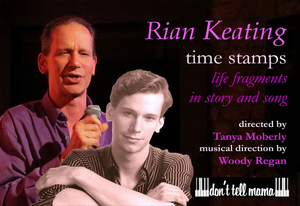Review: RIAN KEATING Tells Boldly Confessional Stories In TIME STAMPS at Don't Tell Mama
TIME STAMPS: Fragments of a Life in Story and Song is a Beautiful Evening

As long as there have been humans on this planet, we have gathered around a fire to tell stories of ourselves. Heroic stories, sad stories, funny stories, stories of journeying and love and battles, triumphs, and defeats. Such stories are how we cope with a world that frequently makes no sense. It is how we remind ourselves that no matter how different we may be, we share a common humanity and we are all traveling around the sun at the same dizzying pace. And even though our fire is now electric and our stories have become more complex and come in the form of films and plays and musicals and albums, they still serve the same function, to remind us that we are alive and on the same road no matter where our ultimate destination lies.
Rian Keating is a masterful storyteller. His stories are filled with humanity. And even though his tales are very personal and specific, they remind us all that at the heart of things, we are all struggling with the same emotions and challenges. We are all looking for our place in the world while dealing with challenges and joys and heartbreaks. This is the focus of his new show TIME STAMPS: FRAGMENTS OF A LIFE IN STORY AND SONG which opened last night at Don't Tell Mama. You may remember Rian Keating from the early days of NY cable access when he interviewed some of the biggest theatre celebrities on his show SPOTLIGHT. Or you may have seen one of his many shows at Don't Tell Mama where he shared his stories and songs. Rian has spent many years in education, as a teacher and on the board of education. This show, like all of his theatrical endeavors, was a fundraiser for the GOLDEN DOOR SCHOLARSHIP, an endowment dedicated to undocumented students who do not otherwise have funds available for higher education. Keating is a special person, indeed.
The show is structured as a set of assignments he completed as he took a course on memoir writing, each with a time stamp. Each assignment details a story from his extraordinary life, growing up as the second child in an Irish-American family who struggled with both his sexuality as well as being hard of hearing. On the very day he graduated high school, he boarded a bus headed for NY to make his future. There are too many wonderful stories to give them all away here, but one of my favorites involved a local minister's wife, whom Keating befriended in his hometown community theatre who came to visit him in New York. The story took a "Mrs. Robinson" twist that was both funny and touching. The story was punctuated with the Bobby Goldsboro tune "Summer, the First Time."
He arrived in NYC in 1979, when midtown was a much tougher, seedier place. He told a terrifying story of returning home from a Broadway show when he was attacked by a gay basher in Grand Central Station, still clutching the Playbill from Sweeney Todd with Angela Lansbury's autograph. Locked out of his building with a curfew, he spent the night sheltered under the trees of Central Park. He used Peter Allen's "6:30, Sunday Morning" as commentary. He also shared his story of wandering into Don't Tell Mama with Jacques Brel's "Old Folks" to sing at an open mic. The performance that night was an unmitigated disaster but he found a new home nonetheless. Jacques Brel figures prominently in many of Rian Keating's stories and the songs in his show function as Brel-like commentary on the action of the stories.
The most beautiful story of the evening involved Keating's younger sister, Moira, the only girl in a family of boys, and thus the apple of everyone's eye. He told a devastating story of how she suffered from cutting and mental illness. After his mother's death he had to make the very difficult decision to evict his sister from the home she shared with their mother and put her in an institution where she could get the help she needed. The story was layered with so many complicated emotions and Keating described the scene so unsparingly it was heartbreaking. He used Judy Collin's eccentric lyric "Albatross" to perfectly wrap up the beautiful story.
Throughout his evening, Rian Keating was supported by the lovely arrangements of musical director, Woody Reagan. The two have been working together for many years since they fatefully meet in a class at HB Studios. Director Tonya Moberly used her sharp eye to keep the evening moving along at a brisk pace. TIME STAMPS is much more than Rian Keating's memoir in cabaret form. It is a testament to the fragility and preciousness of the human condition. His stories, in the end, are about all of us, as all good stories are. I am thankful to Rian Keating for reminding us that our differences are very small compared to our commonalities. Bravo!
For more information about Rian Keating and the Golden Door Scholarship follow him @rian.keating.3 on Instagram or @riankeating on Twitter. To see other wonderful acts at Don't Tell Mama, visit donttellmamanyc.com.
Reader Reviews

Videos

